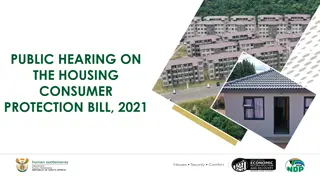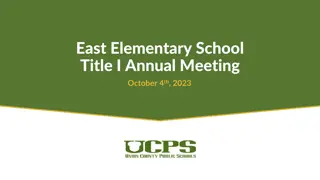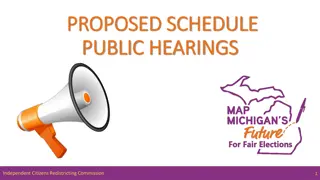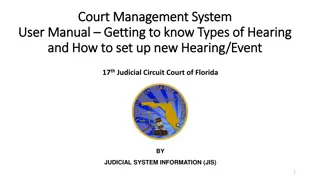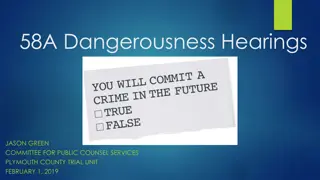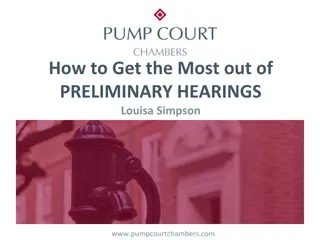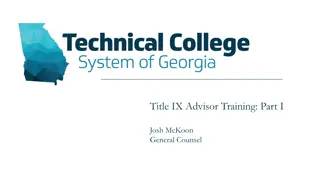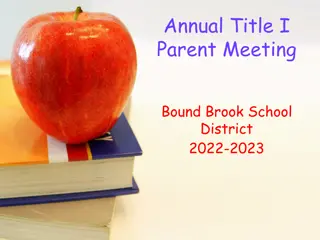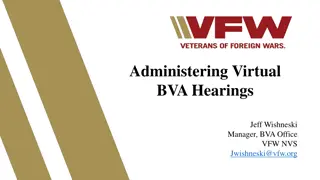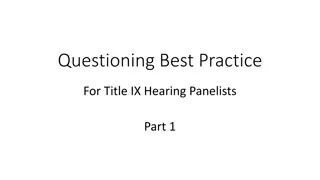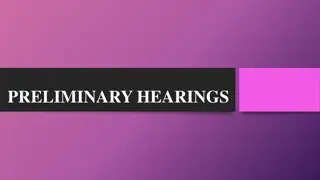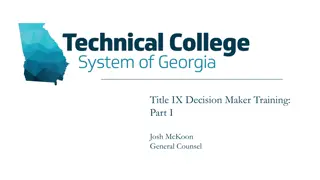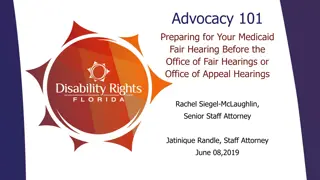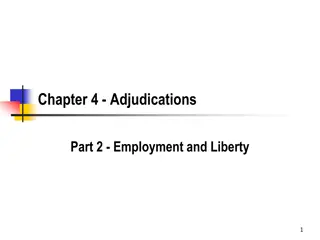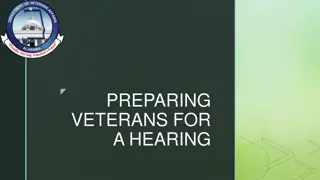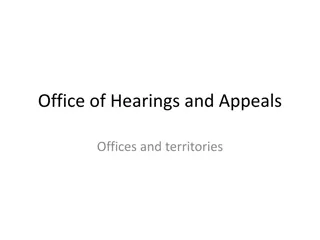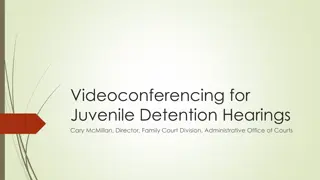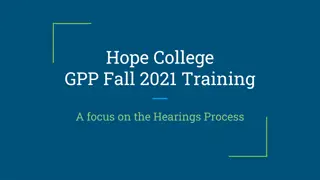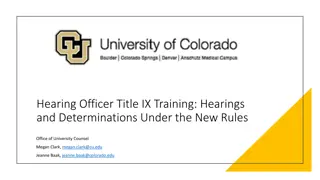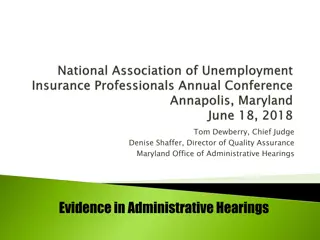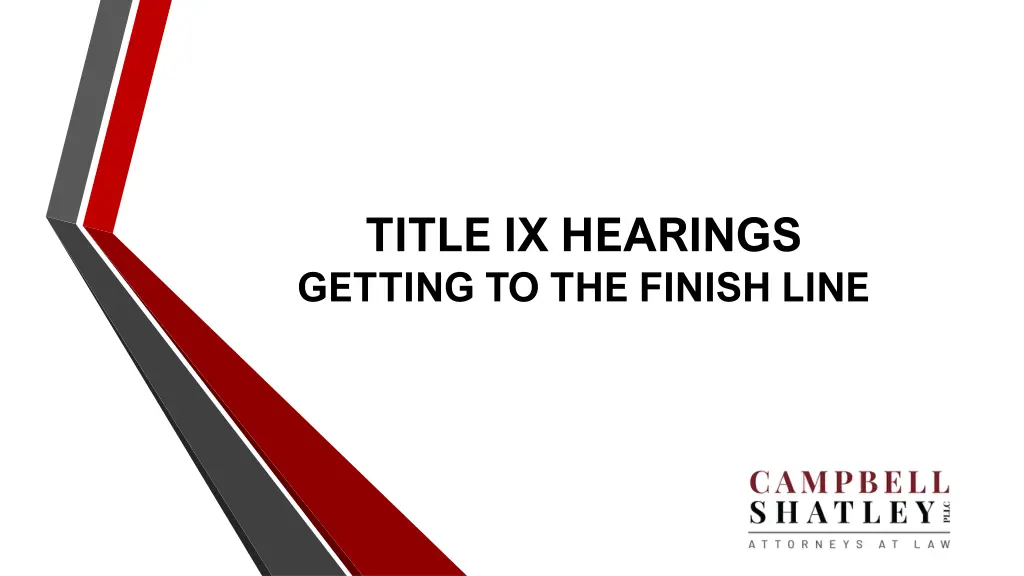
Finish Line: Navigating Title IX Hearings
Understand the process of Title IX hearings, from investigation to decision-making. Learn about the importance of a live hearing with a separate decision-maker and the standards of evidence required for reaching a determination.
Download Presentation

Please find below an Image/Link to download the presentation.
The content on the website is provided AS IS for your information and personal use only. It may not be sold, licensed, or shared on other websites without obtaining consent from the author. If you encounter any issues during the download, it is possible that the publisher has removed the file from their server.
You are allowed to download the files provided on this website for personal or commercial use, subject to the condition that they are used lawfully. All files are the property of their respective owners.
The content on the website is provided AS IS for your information and personal use only. It may not be sold, licensed, or shared on other websites without obtaining consent from the author.
E N D
Presentation Transcript
TITLE IX HEARINGS GETTING TO THE FINISH LINE
THE PROCESS Formal Investigation & Report Incident Initial Assessment Appeal Hearing
So what happens after an investigator gives the parties an investigative report? College must choose a separate, independent "decision-maker" (cannot be the investigator or the Title IX Coordinator). HEARINGS? At least 10 days after issuing the investigative report, the College must hold a "live" hearing in front of the decision-maker to determine a Respondent s responsibility
DECISION-MAKERS Decision-makers have no side other than the integrity of the process. And decision-makers represent the College s process. Remember that the burden of proof and the burden of gathering evidence sufficient to reach a determination rests on the College, not on the parties.
"Motions" hearing Meeting of panel, if any Review of investigation report Review of evidence Preparation of questions Should include: Must include: PRE-HEARING PREPARATION Conflicts check Recusal protocol What About? Meeting with investigators? Ensuring rules of the hearing are followed?
PRE-HEARING PREPARATION Always Review: Written notice of allegations Policy(-ies) alleged to have been violated Investigative report Always Think: What do I need to know? Why do I need to know it? Who is the best person to get this information from?
STANDARDS OF EVIDENCE Standard of Evidence Level of Proof Beyond a Reasonable Doubt Highest standard of evidence; used in criminal law; facts of the case lead to only one reasonable conclusion Clear and Convincing Hybrid; proof that a particular fact or event was highly and substantially more likely than not to have occurred Preponderance of Evidence Civil standard; proof that a fact or event was more likely than not to have occurred
"Live" hearing in-person or virtual Requirements: All parties must be able to see and hear questioning. All parties must be able to present witnesses. Parties advisors are permitted to cross- examine parties and witnesses. College must provide an advisor(s) to parties that do not have one at a hearing. College must provide either an audio recording, audiovisual recording, or transcript of the hearing to all parties. Legal Rules of Evidence do not apply at hearings. HEARINGS!
HEARINGS: GENERAL LOGISTICS Access to administrative support if needed Phones, copiers Recording How, by whom, etc. Attendance by parties and witnesses Advisors Parties and witnesses waiting to testify Location and room set-up Comfort items Privacy concerns Breaks Seating arrangements Use of A/V Materials
RULES FOR HEARINGS So long as all rules comply with the federal regulations and apply equally to both parties, Colleges can adopt rules concerning: Rules of decorum. Timing and length of breaks. Prohibition on disturbing the hearing. Prohibition on badgering witnesses.
TIPS FOR DECISION-MAKERS Recognize the need for flexibility with the order of statements and questioning Be familiar with your institution s hearing procedures If a procedural question arises that must be addressed immediately, take a break to seek clarification Will you have legal counsel available by phone/text/in person?
HEARING TESTIMONY Determine Provide Manage Recognize When necessary, provide directives to disregard a question or information deemed irrelevant, abusive, or repetitive. Manage advisors as necessary. Recognize your authority and maintain professionalis m. Determine the relevance and appropriatenes s of questions. Pause after each question to "rule" on relevance. State your rationale for the record.
QUESTIONING SKILLS AND GUIDELINES Your goal is to ensure you understand information contained in the Investigation Report: Relevant facts about what happened Any related events Any corroborating information Use questions to elicit details, eliminate vagueness, or fill in the gaps Your goal is not to: Satisfy your curiosity Chase the rabbit into Wonderland Do not expect a "Gotcha" moment. You are not prosecutorial.
IF YOU THINK YOU HAVE TO ASK A QUESTION, ASK YOURSELF Is the answer already in the report or documentation I have been provided? If not, why not? (Ask the Investigator!) What do I need to know? Who is the best person to ask? Usually it will be the Investigator, first, and then the original source, if available. Why do I need to know it? If it is not going to help you decide whether a policy was violated, then it is not a good question. What is the best way to ask the question? Are you the best person to ask this question?
ASKING GOOD QUESTIONS Generally, use open-ended questions (tell us who, what, how ) Try to avoid close-ended questions (did you were you ) Don t ask compound questions Don t ask multiple choice questions Avoid suggesting an answer in your question
Understanding evidence Relevance DECISION- MAKING SKILLS Reliability/credibility Cross-examination Analyzing information
UNDERSTANDING EVIDENCE If information helps to prove or disprove a fact at issue, it should be admitted. If credible, it should be considered. Evidence is any kind of information presented with the intent to prove what took place. Certain types of evidence may be relevant to the credibility of the witness, but not to the alleged policy violation directly.
UNDERSTANDING EVIDENCE No restriction on parties discussing case or gathering evidence. Equal opportunity to: Present witnesses, including experts Present evidence Inspect all evidence, including evidence not used to support determination No limits on types/amount of evidence that may be offered except that it must be relevant.
Evidence is generally considered relevant if it has value in proving or disproving a fact at issue: Alleged policy violation A party or witness credibility The investigator will have made initial relevance "decisions" by including evidence in the investigation report . RELEVANCE But relevance is ultimately up to the decision-maker, who is not bound by the investigator s judgment.
UNDERSTANDING EVIDENCE Decision-maker may consider and assign weight to different types of evidence: Documentary (diary, journal) Electronic (photos, text messages) Real/physical (clothes) Direct or testimonial (personal observation) Circumstantial (not eyewitness, but compelling) Hearsay (statements made outside the hearing)
Evidence of a Complainants prior sexual behavior or predisposition is not relevant except when: Offered to prove that someone other than the Respondent committed the alleged conduct, or Concerns specific incidents of the Complainant s sexual behavior with respect to the Respondent and is offered to prove consent. SPECIFIC EVIDENCE ISSUES Even if admitted/introduced by the Complainant Does not apply to Respondent s prior sexual behavior or predisposition
Specific, written permission required in advance of a hearing for records made or maintained by a physician, psychiatrist, or psychologist ADDITIONAL EVIDENCE RESTRICTIONS
WHAT IS CREDIBILITY? Accuracy and reliability of information Primary factors: corroboration and consistency Avoid too much focus on irrelevant inconsistencies Source + content + plausibility Credibility assessment may not be based on a person s status as a Complainant, Respondent, or Witness
WHAT IS CREDIBILITY? Inherent plausibility Does this make sense? Be careful of bias influencing sense of "logical" Motive to falsify Do they have a reason to lie? Corroboration Independent, objective authentication Past record Is there a history of similar behavior?
Clothing "Just look at what she was wearing." Appearance "She is so unattractive. I don t believe anyone would do that to her." Flirting behavior "She s always flirting, what did she expect?" Male accuser "He should have realized she meant it as a compliment." Sexual orientation of accuser "He came out of the closet and told everyone he should have expected people would act like this." WHAT IS (NOT) CREDIBILITY?
"Ive known him for 15 years, he wouldn t do that." Character witnesses "Everybody likes him, I just don t believe he would do that." Popularity WHAT IS (NOT) CREDIBILITY? "She s never been in trouble before." No history of past problems "But he s a really good student." Academic performance Importance to a team or program "She s our best tutor."
QUESTIONING & CROSS-EXAMINATION What is an Advisor s role during a live hearing? Who can serve as an Advisor? Employees on campus External individuals (attorneys, retired judges, etc.) Employees of other colleges How will the College designate Advisor(s) for parties that do not have their own?
QUESTIONING & CROSS- EXAMINATION If a person does not submit to cross-examination at the hearing, the decision-maker may rely on any (previous) statement of that person in reaching a determination regarding responsibility. The decision-maker cannot draw an inference about the determination regarding responsibility based solely on a person s absence from a hearing or refusal to answer cross-examination questions.
The decision-maker cannot draw an inference about the determination regarding responsibility based solely on a person s absence from a hearing or refusal to answer cross- examination questions. If a person does not submit to cross- examination at the hearing, the decision- maker may rely on any (previous) statement of that person in reaching a determination regarding responsibility. QUESTIONING & CROSS- EXAMINATION
BIDEN ADMINISTRATION ENFORCEMENT OF CROSS-EXAMINATION Not happening! In 2021, the Department of Education announced it will not enforce the federal regulation requirement of cross-examination in Title IX hearings. What do the 2023/2024 proposed regulations say about this?
2023/2024 PROPOSED FEDERAL REGULATIONS ON CROSS-EXAMINATION Permit removal of the cross-examination requirement unless the process is required by other law. Allow higher education institutions to return to the single-investigator model, including allowing investigators to make decisions regarding responsibility . No live hearing requirement! If these changes move forward, are there due process risks for higher education entities??
TITLE IX DETERMINATIONS AND APPEALS
ANALYZING INFORMATION POST-HEARING Decision-maker determines the greater weight of credibility on each key point in which credibility is at issue. First, narrow to the contested facts, and then make a credibility analysis by the standard of proof for each. Then, weigh the overall credibility based on the sum total of each contested fact. When you write the final, written determination, focus on what facts, opinion, and/or circumstantial evidence supports your conclusion. Offer a cogent and detailed rationale.
ANALYZING INFORMATION POST-HEARING Parse the Policy again, remind yourself of the elements that compose each allegation. Determine whether it is more likely than not that Policy has been violated or determine whether highly probable if clear & convincing standard applies. Do not turn to "outside" evidence.
Within 10 days of a live hearing, the decision- maker must issue a written determination of responsibility, including: Summary of allegations; Procedural steps taken by College to investigate; Findings of fact supporting the determination; Conclusions regarding whether the alleged conduct occurred; Rationale for the result as to each allegation; Any disciplinary sanctions recommended or imposed on the Respondent; Whether remedies will be provided to the Complainant; and The College s appeal procedures. DETERMINATION OF RESPONSIBILITY
Decision-maker should author the written determination. (Who reviews?) Written determination should be provided to parties simultaneously. DETERMINATION OF RESPONSIBILITY: LOGISTICS Determination becomes final either on the date the College provides the parties with the appeal result, or if an appeal is not filed, the date on which an appeal would not be timely. FERPA cannot be construed to conflict with or prevent compliance with Title IX.
SANCTIONING IN TITLE IX CASES Title IX and case law require: Decision-maker should decide sanction if credibility will influence the sanction Not act unreasonably to bring an end to the discriminatory conduct (Stop) Not act unreasonably to prevent the future reoccurrence of the discriminatory conduct (Prevent) Restore the Complainant as best you can (Remedy)
COMMON SANCTIONS Warning Probation Loss of privileges Counseling No contact Limited access to campus Service hours Online education Alcohol and drug assessment Suspension Expulsion Termination
APPEALS College must offer all parties the opportunity to appeal responsibility determination (and College s dismissal of a formal complaint) on these grounds: Procedural irregularity that affected the outcome; New evidence that was not reasonably available at the time the determination was made that could have affected the outcome; and/or The Title IX Coordinator, investigator, or decision-maker had a conflict of interest or bias that affected the outcome. Must provide notice to both parties when appeal is filed. Must provide both parties a chance to submit a written statement supporting or challenging the initial decision. Appeal decision-maker must be a different person from the Title IX Coordinator, investigator, or (initial) decision-maker. A written, final decision that describes the appeal result and its rationale must be provided to both parties.
APPEAL PROCESS Decision Stands Re-open/New Investigation Accepted Remand New or Re-Hearing Sanction Adjusted Sanctions-Only Re-Hearing Request for Appeal Denied Decision Stands
Campbell Shatley, PLLC 674 Merrimon Ave., Suite 210 Asheville, NC 28804 (828) 398-2776

